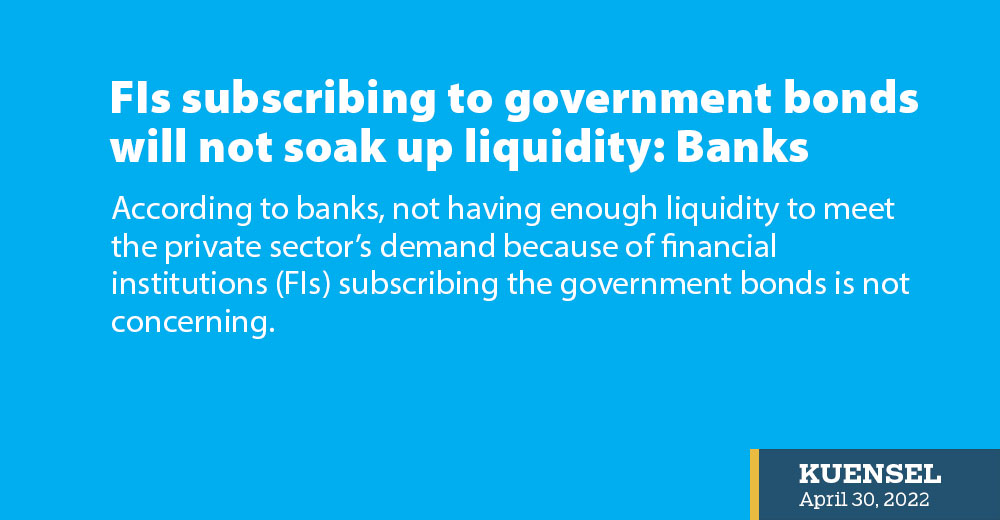Thukten Zangpo
According to banks, not having enough liquidity to meet the private sector’s demand because of financial institutions (FIs) subscribing the government bonds is not concerning.
The Bhutan Chambers of Commerce and Industry, on behalf of the private sector, submitted to the government recommending the banks to not participate in the subscription of bonds floated by the government as one of the measures for economic recovery.
“Bonds are means to raise funds; however, this method does soak up the liquidity within the banks,” it stated, adding that if additional rounds of government bonds are floated, it may be prudent to exclude the commercial financial institutions from participating.
One of the private members said that with the expectation that the government will open up the economy by July this year, businesses will pick up.
If banks bought the long-term bonds, the liquidity in the banks would be locked up and it would not be available for business to take loans. “I am quite worried that the banks have subscribed to long-term bonds,” he said.
So far, the government has borrowed Nu 8.2 billion from the domestic market through the issuance of government bonds (3 to 10 years term) to meet the fiscal financing requirements and mobilise funds for Covid-19 purposes. The majority of the subscribers are financial institutions.
Chairman of Financial Institutions Association of Bhutan and chief executive officer of Royal Insurance Corporation of Bhutan, Karma, said that the banks’ subscription of the bonds is not a concern because funds used for subscription are from statutory liquidity ratio (SLR) and it is also in small quantity.
SLR is a certain amount of reserve money the banks need to keep in case the public wants their money back.
Banks have to maintain 20 percent of total liabilities or deposits either in the cash or in government securities as mandated by the Royal Monetary Authority’s regulation.
Karma said the SLR, which is lying idle, does not get any returns; a subscription with low-interest bonds are better. “Government securities are zero risk.”
A bank official said that along with the 20 percent SLR, FIs also have to maintain a certain minimum amount of cash with the central banks as a reserve out of their total deposits which are called cash reserve ratio (CRR). The CRR is maintained at 7 percent of the total deposits or liabilities.
“The remaining 73 percent of the deposit is available for the private sector to lend,” he said.
As of February this year, the banks had total liquidity of about Nu 33 billion. The banks have excess liquidity because of the slowdown of the economy amidst Covid-19 pandemic.
The average credit growth in 2021 slumped to 6.9 percent from 18 percent in 2020. Credit growth in 2021 was one of the lowest in a decade.
According to a pre-lockdown estimate of the government, credit to private sector was expected to increase from 6.9 percent in the fiscal year 2020 to 2021 to 10.9 percent in the fiscal year 2021 to 2022.
The recommendations from the private sector also stated that the National Pension and Provident Fund, Bhutan Trust Fund, Druk Holding and Investments (DHI), DHI-owned corporations, and the general public should be roped in and encouraged to subscribe to such bonds.


